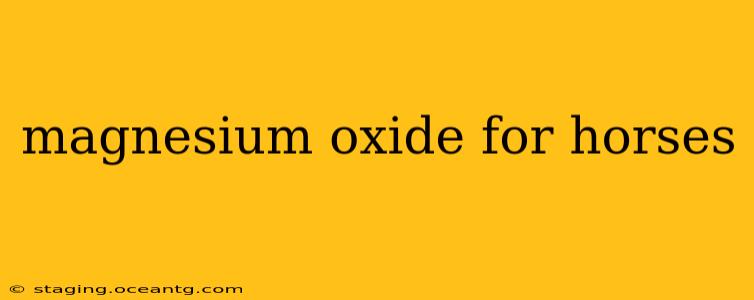Magnesium is a vital mineral for horses, playing a crucial role in numerous bodily functions. A deficiency can lead to various health problems, making understanding magnesium oxide supplementation essential for horse owners. This comprehensive guide explores the uses, benefits, and potential drawbacks of magnesium oxide for equine health.
What is Magnesium Oxide and Why is it Important for Horses?
Magnesium oxide is a common supplement form of magnesium, a crucial element involved in over 300 enzymatic reactions within the horse's body. It's vital for muscle function, nerve transmission, blood sugar control, and protein synthesis. A deficiency can manifest in various ways, impacting performance and overall well-being. While horses typically obtain sufficient magnesium through their diet (especially pasture), certain factors can lead to deficiency, prompting the use of supplements like magnesium oxide.
What are the Benefits of Using Magnesium Oxide for Horses?
Magnesium oxide offers several potential benefits for horses, including:
- Improved Muscle Function: Magnesium is crucial for muscle contraction and relaxation. Supplementation can help prevent muscle cramps, stiffness, and tying-up syndrome, particularly beneficial for performance horses.
- Enhanced Nervous System Function: Magnesium plays a key role in nerve impulse transmission. Adequate levels support a healthy nervous system, contributing to calmness and improved behavior.
- Better Blood Sugar Control: Magnesium is involved in insulin function and glucose metabolism. Supplementation might help manage blood sugar levels, particularly in horses prone to insulin resistance or equine metabolic syndrome (EMS).
- Support for Digestive Health: While not directly a primary function, magnesium can indirectly support gut health by aiding in enzymatic processes related to digestion.
- Improved Bone Health: Magnesium contributes to bone density and strength, contributing to overall skeletal health.
What are the Potential Side Effects of Magnesium Oxide in Horses?
While generally safe, excessive magnesium oxide supplementation can lead to side effects. These may include:
- Diarrhea: This is a common side effect of magnesium oxide, especially with high doses.
- Dehydration: Excessive magnesium can cause fluid imbalances, leading to dehydration.
- Muscle Weakness: Paradoxically, very high levels of magnesium can interfere with muscle function, resulting in weakness.
It is crucial to consult a veterinarian before starting any magnesium oxide supplementation to determine the appropriate dosage and monitor for potential side effects.
How Much Magnesium Oxide Should I Give My Horse?
The dosage of magnesium oxide for horses varies greatly depending on several factors, including the horse's weight, age, health status, and the reason for supplementation. Never attempt to self-diagnose and treat your horse; always consult a veterinarian to determine the appropriate dosage and administration method. They can conduct blood tests to assess magnesium levels and recommend the best course of action. Incorrect dosage can be detrimental to your horse's health.
What are the Different Forms of Magnesium Supplements for Horses?
Magnesium oxide is just one form of magnesium supplementation available for horses. Other forms include magnesium chloride, magnesium sulfate (Epsom salts), and magnesium citrate. Each form has different absorption rates and potential side effects. Your veterinarian will help determine which form is most suitable for your horse's specific needs.
Can I Give My Horse Magnesium Oxide Without Vet Consultation?
No. While magnesium oxide is generally considered safe, it's crucial to consult your veterinarian before starting any supplementation. They can assess your horse's health, determine if a magnesium deficiency exists, and recommend the appropriate dosage and form of magnesium. Self-treating can lead to unintended consequences and potentially harm your horse.
What are the Signs of Magnesium Deficiency in Horses?
Recognizing the signs of magnesium deficiency can be challenging as they can mimic other health issues. Symptoms can include muscle tremors, stiffness, hyperirritability, tetany, and even seizures. However, subtle deficiencies might not display obvious symptoms, making regular veterinary checkups and blood testing crucial.
Conclusion
Magnesium oxide can be a valuable supplement for horses in certain situations, but responsible use is critical. Always consult your veterinarian before administering any supplements, including magnesium oxide, to ensure safe and effective usage. They can help diagnose underlying issues, determine the correct dosage, and monitor your horse's response to treatment. Remember, preventative care and regular veterinary checkups are essential for maintaining your horse's overall health and well-being.
